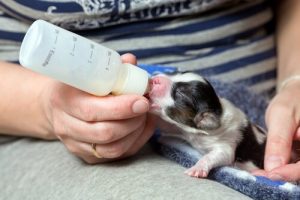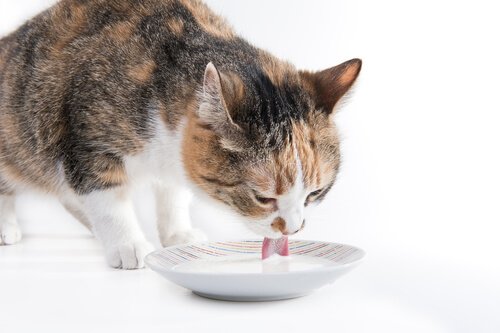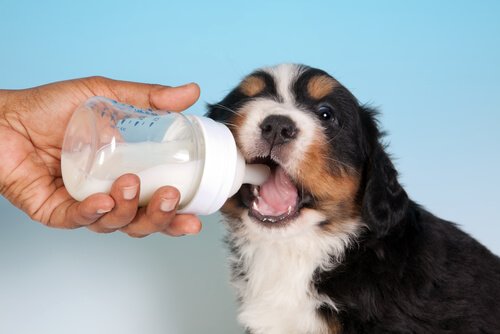Cow's Milk Is Not Good for Puppies and Kittens


Written and verified by the lawyer Francisco María García
We’ve all seen images of puppies and kittens drinking from a bowl of milk. However, you should know that cow’s milk doesn’t meet their nutritional requirements.
In this article, you’ll find out why cow’s milk and its derivatives can be harmful to your pet’s health. However, if you still wish to give your pet milk, you have to learn how to choose the most suitable one for them.
Can dogs drink milk? What about cats?
Many pet owners wonder if they can give their four-legged friends some milk. They want to know if it’s unhealthy and if it will be harmful to their digestive system.
Keep in mind that lactose hasn’t really got any good news in recent years. So, is cow’s milk good or bad for puppies and kittens? To answer that question, you have to understand that animals’ nutritional needs change as their bodies develop.
A newborn puppy’s nutritional needs are totally different than those of an adult dog or a weaned puppy. The same goes for cats and other mammals. During breastfeeding, breast milk is the only ideal food that meets all of the puppy’s nutritional needs.
In order to meet these needs at this stage of their lives, kittens and puppies produce a large amount of an enzyme called “lactase.” Its main purpose is to digest the lactose molecules found in breast milk.

However, when the puppy goes through the weaning period, lactase production gradually decreases. Weaning is the food transition that all mammals go through during their infancy. It’s when they stop drinking breast milk and start trying other foods.
This is one of the most important transformations that the puppy’s small body will experience when preparing for adult life and eating independently.
Lactose intolerance in dogs and cats
When a puppy is done weaning, its body will produce lactase at very low levels (or not at all, in many cases). This means that their body is already prepared to stop consuming breast milk and eat other types of foods. These changes are actually based on a developmental change, so you should never abruptly change your puppy’s diet.
Since they now have little to no lactase in their bodies, it will be very difficult to properly digest lactose. So, most dogs and cats become lactose intolerant after they’ve finished weaning.
Due to all of the reasons above, drinking cow’s milk — or any other mammal’s milk — can cause serious digestive problems like diarrhea, vomiting, allergies, etc.
You should always keep your pet’s body’s capabilities, limits and needs in mind when feeding him. The best way to offer your best friend a complete and balanced diet is by following the professional guidance of a veterinarian.

Can I give cow’s milk to puppies that are nursing?
You have to understand that cow’s milk has a very different composition than milk that comes from a cat or dog. Therefore, due to puppies producing high levels of lactase, cow’s milk can cause digestive orders.
Also, it’s essential that puppies stay with their mothers during their first months of life. Not only to ensure they’re feeding properly but also to develop their physical and cognitive abilities.
The mother is responsible for safely showing her children the world for the first time. She will also teach them how to survive on their own and how to interact with their environment and peers.
Before adopting a new pet, make sure that they have been fully weaned. If you prematurely separate a cat or dog from their mother, they will have a hard time learning and socializing. It will also weaken their immune system which will make them more vulnerable to numerous diseases.
If for some reason you have to adopt a lactating puppy, you should try to find an animal “wet nurse“. Or, if you can’t find a mother dog or cat to breastfeed, you could also use a formula.
You can find powdered infant formula in veterinary clinics and pet stores. Or, you could also make it at home using reduced lactose cow’s or goat’s milk.
This text is provided for informational purposes only and does not replace consultation with a professional. If in doubt, consult your specialist.